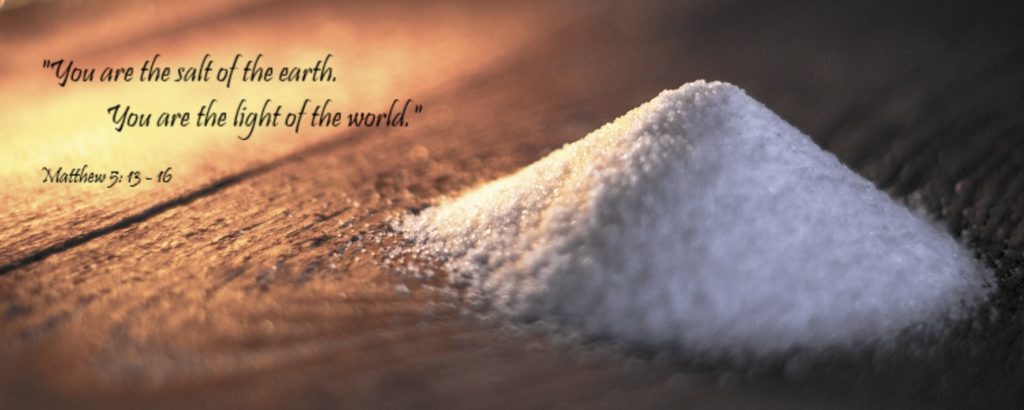Scripture for the fifth Sunday of Epiphany:
Isaiah 58.1–9a; Psalm 112.1–9; 1 Corinthians 2.1–12; Matthew 5.13–20.

Apparently the most memorable thing that I have said about salt and scripture is to mention the Flor de Fornells gourmet salt products from reclaimed salt mines Menorca. Otherwise, salt seems to be something that we generally just take for granted in today’s world. Apart from those occasional, specialised, gourmet versions, it’s just there. Or not, if we have health issues.
It’s the same with light: we expect to flip a switch and there’s instant light. Two thousand years ago, things were different. Light involved the purchase and maintenance of candles or oil lamps. Salt was quite a precious commodity, essential for the preservation of food, and often used for healing.
So why did Jesus use these curious words about his disciples being salt and light – and losing saltiness, or hiding the light? Perhaps he was using an absurdity to make his point in a humorous way.
His disciples were meant to be learners (that’s what a disciple is), but they also were to be apostles, sent out into the world to be salty in preserving the faith that he taught and to be light to shine into the dark areas of injustice – and to be agents of peace, or shalom, which has a deeper meaning than simply absence of conflict.
To be effective, they had to find harmony in their mission. Harmony is a huge challenge at the heart of Paul’s letter to the Corinthians. Ironically, his challenge was a penalty of his success. In most places, Paul had limited success in reaching people; in Corinth he appealed to such a wide cross-section of the community that it was difficult to maintain an absence of conflict, never mind find the inner peace of shalom. The Corinthian church was so busy arguing about leadership, belief and religious practice that it is hard to imagine much progress made in being salt and light to the world around.
We ought to give Paul some credit, because although in many ways he was probably not very appealing to some of the Corinthian aristocracy (he probably appeared them as a scruffy little man, lacking in sophisticated rhetoric, who supported himself with tent making), he simply stuck to his basic message, which is that Jesus’ example was to love one another.
We might learn from this, of course. There is injustice in our world and there is conflict; shalom seems rather a distant promise. The gospel is a call to action for us to shine light into shady areas where injustice is able to take root and flourish. It is a call to bring the ‘kingdom of God’ nearer by being the salt to preserve the essence of Christian faith. It is rather difficult to make progress in this if we are busy squabbling like the Corinthians.
There is one other aspect of this: the metaphors of salt and light break down when life hands us the more difficult parts of the human condition. The loss of health, work, relationship, or loved ones can drain us of our saltiness. Those are times when the Christian community needs to be the salt used to heal one another and the light that shines with Christ’s love and dispels the darkness of sadness, fear, or despair.
In any case, focusing on our shared Christian mission, and on taking care of those in need within our community of faith, should draw us together in common purpose and harmony, to be true people of salt and light. As Paul persisted in saying to the Corinthians, in effect: just be kind to one another. Therein lie the roots of harmony.
Comments are closed.